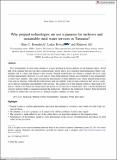| dc.description.abstract | Poor sustainability of rural water schemes is a major problem in service delivery in sub-Saharan Africa. About half of the schemes fail one year after commissioning, mostly due to poor operation and maintenance. Many communities fail to collect and manage water revenue. Prepaid technologies are argued to remedy the poor water revenue management. However, it is not clear to what extent prepaid systems can contribute to the sustainability of rural water schemes. This paper assessed the performance of three different cases where prepaid technologies were used in Tanzania. Although the technologies used can simplify water revenue collection, they are not a panacea to deliver sustainable and equitable water services. The capital cost of the prepaid system is often paid for by donors, which is not being recovered, hence the notion of cost recovery is biased here. Also, a strong institutional capacity and knowledge is required alongside the technology. Therefore, the technology which is being promoted as better for improving cost recovery is, instead, causing a burden on water users. | en_US |

